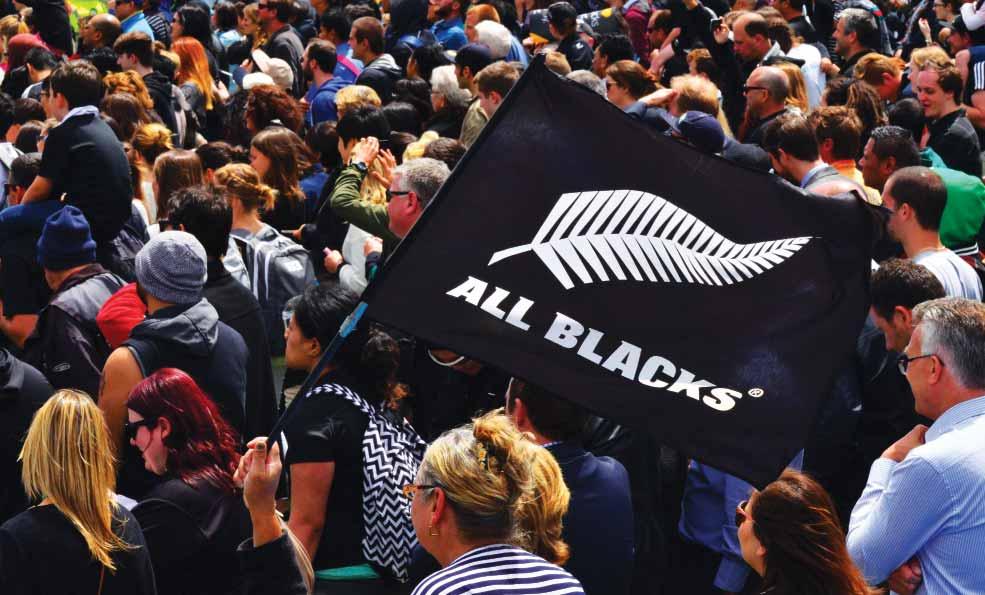
8 minute read
Emotional Connection
The All Blacks recorded the highest BenchMark EC Score™ in 2019 (above) while Australia Women’s Cricket Team saw a meteoric rating rise after their 2020 T20 World Cup win (below).
Georgie Maynard explains why emotional connection holds the key to sponsorship success
Advertisement
True North Research has been measuring the impact of emotional connection on teams and sponsorships since 2018, and one thing doesn’t change - the more emotionally connected someone is to a sports property the more likely they are to engage with a sponsor’s message, product or service.
However, before providing the proof, let’s consider why emotions matter and why they are so integral to sport.
A brand is your signal to the market, it tells the market what you stand for. A brand has both rational and emotional components to it. The rational part of a brand refers to the features, price, quality, While the emotional aspects are the image, style, social proof, trust etc. The aim of the emotional component of the brand is to form a connection, to create a sense of belonging, encourage engagement and drive behaviour.
When we look at sporting brands, it is the emotional component of the brand that is heavily at play. We see this in how our own body language reacts to a property we support: the cheers, the fist pumps for the victories, getting to our feet when we can’t take the nervous tension or at the hint of a comeback and even the tears after a heart-breaking loss.
If you ask yourself why you follow a team (or individual) it will be driven by emotional aspects. Perhaps it is a team your parents followed, a highly successful team or a team that has strong social values and good leadership. Whatever the reasons, at the heart of why you follow a team or individual will be the core emotional values of respect, enjoyment, trust, pride and the bond. These core values will have developed over time and bound you to the property. So, given the reasons we connect to sporting teams are driven by emotions, evaluating that emotional connection and its drivers is absolutely key to understanding the behaviours that will result from that connection.
A tangible example of this is the emotional connection to rugby league’s Queensland Maroons which is one heavily rooted in state pride and the historical connection to the team that Queenslanders will have formed throughout the course of their lifetime. This team frequently achieves one of the top fan emotional connection scores (BenchMark EC Score™).
For the Women’s National Cricket Team, who saw a meteoric rise to their BenchMark EC Score™ post their 2020 T20 World Cup win, it was the surging respect and pride in the team that contributed to their rise to the top of the BenchMark rankings in April 2020.
Across the Tasman, the All Blacks recorded the highest BenchMark EC Score™ in 2019 (which may not be as high in 2022) based on a strong familial connection to the team, that
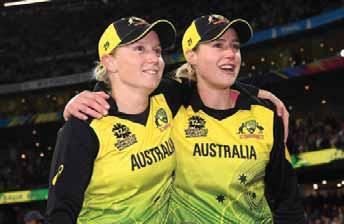
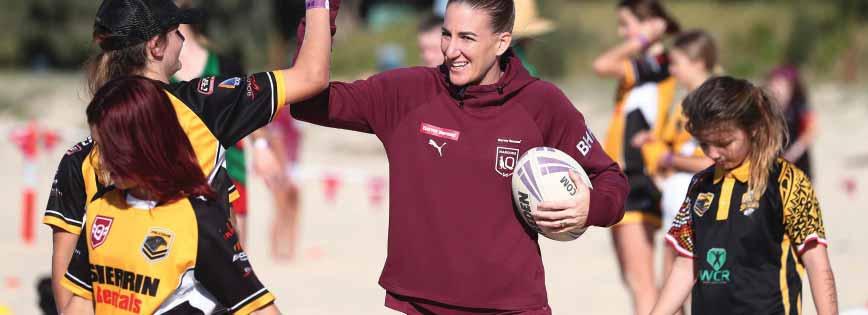
Brands like women’s Queensland Maroons engage with grassroots (above) while the NRL’s Dragons and St George Bank (below) and Panthers and OAK plus (right) enjoy longstanding links.
is passed down to each generation, often starting at birth when young Kiwis are dressed in baby rompers adorned with the silver fern. In England, the Lionesses have realised a dream, one that has taken 56 years to materialise, an English victory in the Euros ending a long drought for silverware at international level. We hope to measure their BenchMark EC Score™ in the coming months.
We cannot simply look at outcome-based measures like attendance, ratings and membership and understand how the sports fans think and how they will act next. Emotions matter because they drive these outcomes, affect long term advancement and protect a property when in crisis. Sports brands and sponsors need to understand this component, the emotional connection to sporting properties as it is integral to why we connect and engage with sponsors.
Thinking back to your own experience, the stronger your connection the more likely you are to pay to watch them on TV, go to a game, buy merchandise and be aware of, and engage with their sponsors. And that’s the crux of it: emotional connection drives dollar-driven behaviours.
BenchMark proves this link So for the proof … our first BenchMark Report, launched in November 2018, discovered that the stronger the emotional connection to a sports team, the more likely an individual is to connect to the team’s sponsors. Where there is a strong emotional connection to teams more than two in five people, aware of the sponsorship, will have some form of positive reaction to the sponsor.
This could be positive sentiment towards the sponsor’s brand, greater consideration, first time usage or more frequent usage of the brand’s products or services, or greater trust towards the sponsor and/or its message. For some properties, with a very strong BenchMark EC Score™, this can be even higher, with up to 60-70% of those aware of a sponsor having a positive reaction to the sponsor’s brand.
The crucial step for a rights holder is developing a stronger emotional connection between fans and the sports property. To do this they need to understand the drivers of emotional connection to an individual, team or league. The BenchMark product does exactly this. For sponsors, they need to tap into these drivers of connection.
Best selling journalist and writer, Malcolm Gladwell, known for his nonfiction writing on psychology and sociology, emphasises that “emotion is contagious”.
Through sponsorship we want to harness this contagious emotion and the behaviour that runs from it. Sponsors will benefit by understanding the drivers of emotional connection to a team and then leveraging these drivers in their activations. This engages the audience with their brand and drives the desired behaviours and outcomes. Repeated exposure to the brand in the environment of a positive emotional experience eventually results in an emotional response to the brand - it’s just conditioning. So eventually you feel good about the brand without the intermediary.
Sponsorships should be mutually beneficial partnerships, where the sponsor gains positive brand rub off, ideally where brand values are aligned, and in return the sponsor provides funding and ideally relevance to fans through effective activations. Sponsors are best served by identifying sports properties with the best brand fit, where the target audience is emotionally connected, and the sponsorship will deliver the desired behavioural outcomes.
Some of the most recognised sports sponsorships in Australia are driven by longevity, easy association and a good brand fit e.g. Geelong Cats and Ford, St George and the Dragons,
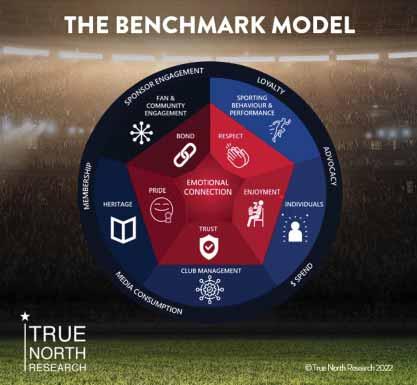
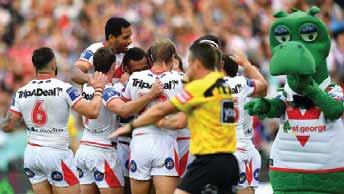
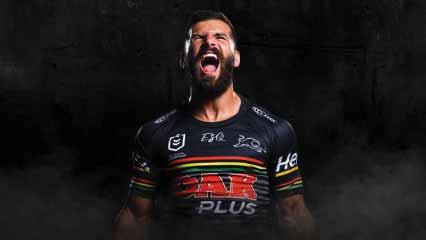
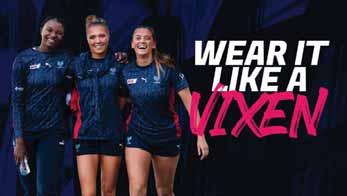
Penrith Panthers and OAK Plus. However, high awareness alone does not automatically guarantee good sponsorship outcomes (although it helps with the overall impact). For a successful campaign, sponsors often require more than just an increase in awareness. Dependent on objectives, sponsors likely want to see a positive reaction to their brand, be it sentiment, consideration, trust etc..
Investing more financially in a sponsorship or picking the best-known teams aren’t always the best way to maximise these sponsorship outcomes. Yet this is the current status quo, as many sports sponsors buy purely on eyeballs when they should be looking at the quality of the connection. Even worse they make decisions based on their own emotions e.g., a chief executive’s decision or opting for a perceived good deal. The only emotions that should be taken into consideration is the market’s, particularly the sponsor’s target market’s emotional connection to the team.
The BenchMark evaluation framework looks at the whole gambit of factors that influence sponsorship success, from the obvious: familiarity of the team, sponsor awareness to the more nuanced: activation options, alignment with brand and target audience, emotional connection to the team, whether the audience is primed for sponsorship messaging, and crucially what proof of returns exist - are current sponsorships driving sentiment, consideration, usage and trust.
So how can sponsors get a good ROI? In terms of value for money, brands can expect to see strong return on investment from teams with a higher emotional connection and where the audience is primed for sponsor messaging. By partnering with lesser known teams but those with a strong BenchMark EC score™ and primed audience, sponsors can reap rewards quickly, Puma’s sponsorship of the Melbourne Vixens is one such example. Puma inherently understood the drivers of emotional connection to netball and leveraged these in its activations, achieving high cut through with not just the Vixens’ audience but the wider netball community.
True North helps sponsors find the sweet spot: high sponsor awareness coupled with a strong emotional connection to the team. While brands like CommBank, Suncorp and Woolworths have been very successful at finding the sweet spot, you don’t need to spend big dollars to have an impact as the Vixens Puma partnership demonstrates.
Understanding the context and the outcomes will help sponsors. If a sponsor is entering a new market and needs to raise brand awareness, looking at properties that will provide that reach and exposure will be important. Men’s teams will often deliver here. However, perhaps the sponsor already has strong awareness but it’s about conversion - greater consideration and usage - here a sponsor wants to partner with properties that have a strong emotional connection as this will be deferred onto the sponsors’ brand. Or maybe the Sponsor needs to reinstill the public’s trust and confidence in it, so here the sponsor should be looking to partner with a property that has an outstanding reputation and is renowned for high levels of trust. This varies by team but frequently it is women’s teams outperforming their male counterparts when it comes to engendering trust. The key is understanding the market, the property, the emotional connection to properties and your objectives. Georgie Maynard is a Director of True North Research. To find out more visit www.researchtruenorth.com
The Melbourne Vixens WNBL team have said no to sports betting sponsorship.

LOCAL UNDERSTANDING, GLOBAL KNOWLEDGE, TRUSTED ADVICE
SCALE + REACH + CAPACITY + TRACK RECORD
Otium Planning Group is a contemporary sport and leisure consultancy providing trusted advice to the sport, recreation and leisure industries. Offices In Melbourne, Sydney, Brisbane, Cairns, Perth, Auckland, Christchurch, Sunshine Coast










